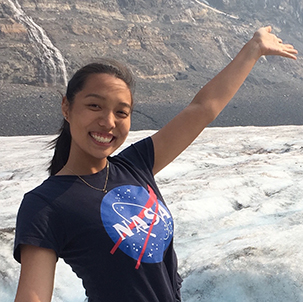Welcome to Emily Zhang, Chandra Summer Intern

Emily Zhang on the Athabasca Glacier in Banff National Park in Canada. Emily traveled there in the summer of 2018, coincidentally just after finishing her first research project at the CfA! Credit: Emily Zhang
We are delighted to introduce Emily Zhang, who is working as a summer intern in the Chandra X-ray Center at the Center for Astrophysics. Emily is spending half of her time working on astronomy research with Dr Pat Slane and half working on science communication with us in the Chandra Communications and Public Engagement group. She is an undergraduate at Columbia University majoring in astrophysics and (hopefully) concentrating in political science. We asked Emily some questions about her background and interests in astronomy and science communication.
How did your interest in astronomy develop?
I remember watching the TV show Nova with my parents when I was little, and thinking that outer space looked so beautiful and so different from the rest of the world I knew. I also remember going on trips to my local planetarium (the Hayden Planetarium at the Museum of Science in Boston) growing up, and coming out of their shows crying at how big the universe was. I have a vivid memory of checking out a book on black holes for kids from the library, and reading that if you went through a black hole, you could end up in a new universe with up to 11 dimensions. This was not something I understood at all as a 4th grader, but I was impressed.
What has your research in astronomy involved?
My first attempt at astronomy research, after I had been quietly interested in space for years, was in sophomore year of high school. All the students were required to do science projects for our local science fair, and I was the only one who decided to do an astronomy project. I teamed up with a physics teacher and studied glitches in pulsars. I’m still very interested in pulsars today, but have branched out a bit to high energy astrophysics in general since starting college: supernova remnants, active galactic nuclei, etc. I love the big, dramatic phenomena. Fun fact: I have worked with Chandra data in every single research project I’ve done since starting college!
Why do you think science communication is important?
I got into astronomy purely based off of the movies and shows and picture books I encountered growing up, and I think that’s the best way to get kids involved in the future. Astronomy in particular is a field that many people enter because they are inspired; it’s unique from so many other STEM disciplines because its appeal is so artistic. Science communication leans into that and makes astronomy research into a philosophical, aesthetic piece about our place in the universe or the art in a supernova. While I think this comes out most in astronomy, it’s true for all scientific research - it is so important to make the cultural connection and see science as a human endeavor. Why do people make movies? Why do people communicate science? It feels like the same thing to me, it always boils down to telling human stories.
What aspects of science communication are you most interested in?
Going off the artistic side that I just mentioned, I’m really interested in multimedia science communication. Working on a gorgeous movie or documentary would be incredible, but for now, I’m aiming more at the internet. I think the public in general is moving towards consuming content either in short videos (i.e. TikToks) or short text (i.e. tweets), and we need to meet them there, especially the people who wouldn’t consume science media otherwise. It’s also fun to combine wacky art and humor and relatability with science, and I don’t think many science communicators have tried that yet. How many astronomers are active on TikTok right now?
What are your plans when you graduate from Columbia?
I’ve gotten really excited about science communication in the past year and have been thinking about getting a master’s in it and really committing to pursuing this as a career. I’m also still thinking about other science options, like going to grad school for a PhD or trying out science policy. And, because I’m indecisive, I’m open to just trying something completely new for a year in the arts (like theatre/visual media, which would hopefully connect back to science communication in the end). Given how quickly things are moving in 2020, though, these plans could fully change tomorrow.
